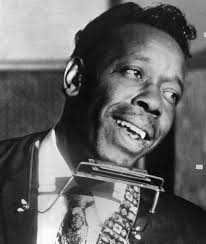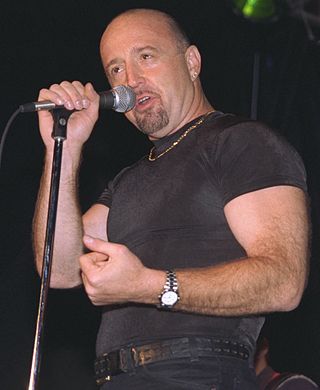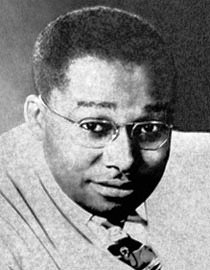
Blues is a music genre and musical form that originated amongst African-Americans in the Deep South of the United States around the 1860s. Blues has incorporated spirituals, work songs, field hollers, shouts, chants, and rhymed simple narrative ballads from the African-American culture. The blues form is ubiquitous in jazz, rhythm and blues, and rock and roll, and is characterized by the call-and-response pattern, the blues scale, and specific chord progressions, of which the twelve-bar blues is the most common. Blue notes, usually thirds, fifths or sevenths flattened in pitch, are also an essential part of the sound. Blues shuffles or walking bass reinforce the trance-like rhythm and form a repetitive effect known as the groove.

Joseph Vernon "Big Joe" Turner Jr. was an American blues shouter from Kansas City, Missouri. According to songwriter Doc Pomus, "Rock and roll would have never happened without him". Turner's greatest fame was due to his rock and roll recordings in the 1950s, particularly "Shake, Rattle and Roll", but his career as a performer endured from the 1920s into the 1980s.

Jimmy Rogers was an American Chicago blues singer, guitarist and harmonica player, best known for his work as a member of Muddy Waters's band in the early 1950s. He also had a solo career and recorded several popular blues songs, including "That's All Right", "Chicago Bound", "Walking by Myself", and "Rock This House". He withdrew from the music industry at the end of the 1950s, but returned to recording and touring in the 1970s.

John Dawson Winter III was an American singer, guitarist, songwriter, and record producer. Winter was known for his high-energy blues rock albums, live performances, and slide guitar playing from the late 1960s into the early 2000s. He also produced three Grammy Award-winning albums for blues singer and guitarist Muddy Waters. After his time with Waters, Winter recorded several Grammy-nominated blues albums. In 1988, he was inducted into the Blues Foundation Hall of Fame and in 2003, he was ranked 63rd in Rolling Stone magazine's list of the "100 Greatest Guitarists of All Time".

Joseph Lee Williams was an American Delta blues guitarist, singer, and songwriter, notable for the distinctive sound of his nine-string guitar. Performing over five decades, he recorded the songs "Baby, Please Don't Go", "Crawlin' King Snake", and "Peach Orchard Mama", among many others, for various record labels. He was inducted into the Blues Hall of Fame on October 4, 1992.

Slim Harpo was an American blues musician, a leading exponent of the swamp blues style, and "one of the most commercially successful blues artists of his day". He played guitar and was a master of the blues harmonica, known in blues circles as a "harp". His most successful and influential recordings included "I'm a King Bee" (1957), "Rainin' in My Heart" (1961), and "Baby Scratch My Back" (1966), which reached number one on Billboard's R&B chart and number 16 on its broader Hot 100 singles chart.

Kim Wilson is an American blues singer and harmonica player. He is best known as the lead vocalist and frontman for The Fabulous Thunderbirds on two hit songs of the 1980s, "Tuff Enuff" and "Wrap It Up."
Victoria Regina Spivey, sometimes known as Queen Victoria, was an American blues singer, songwriter, and record company founder. During a recording career that spanned 40 years, from 1926 to the mid-1960s, she worked with Louis Armstrong, King Oliver, Clarence Williams, Luis Russell, Lonnie Johnson, and Bob Dylan. She also performed in vaudeville and clubs, sometimes with her sister Addie "Sweet Peas" Spivey, also known as the Za Zu Girl. Among her compositions are "Black Snake Blues" (1926), "Dope Head Blues" (1927), and "Organ Grinder Blues" (1928). In 1961, she co-founded Spivey Records with one of her husbands, Len Kunstadt.
The American Folk Blues Festival was a music festival that toured Europe as an annual event for several years beginning in 1962. It introduced audiences in Europe, including the UK, to leading blues performers of the day such as Muddy Waters, Howlin' Wolf, John Lee Hooker and Sonny Boy Williamson, most of whom had never previously performed outside the US. The tours attracted substantial media coverage, including TV shows, and contributed to the growth of the audience for blues music in Europe.

Joseph Christopher Liggins, Jr. was an American R&B, jazz and blues pianist and vocalist who led Joe Liggins and his Honeydrippers in the 1940s and 1950s. His band appeared often on the Billboard magazine charts. The band's biggest hit was "The Honeydripper", released in 1945. Joe Liggins was the older brother of R&B performer Jimmy Liggins.

East-West is the second album by the American blues rock band the Butterfield Blues Band, released in 1966 on the Elektra label. It peaked at No. 65 on the Billboard pop albums chart, and is regarded as highly influential by rock and blues music historians.
Plas John Johnson Jr. is an American soul-jazz and hard bop tenor saxophonist, probably most widely known as the tenor saxophone soloist on Henry Mancini’s "The Pink Panther Theme". He also performs on alto and baritone sax as well as various flutes and clarinets.
Spivey Records was a specialist blues record label founded by blues singer Victoria Spivey and jazz historian Len Kunstadt in 1961. Spivey Records released a series of blues and jazz albums between 1961 and 1985.

Raisin' Cain is an album by Johnny Winter, released in 1980 by Blue Sky Records. A retrospective album review for AllMusic by William Ruhlmann notes the mix of rock and roll, Chicago blues, and New Orleans rhythm and blues/New Orleans blues tunes lacks any compositions by Winter. Ruhlmann gave the album three out of five stars and concluded:
The water-treading of Raisin' Cain suggests that a new approach is in order, maybe an outside producer who can bring a different perspective or somebody to look for good songs, if the artist isn't going to write his own material.

The Johnny Winter Anthology is the first collection to include songs from blues musician Johnny Winter's entire career, from his start at Imperial Records, to his rise to worldwide fame on Columbia and Blue Sky, to his late-career renaissance at Alligator, Pointblank and Virgin.

Blues from the Apple, released in 1974 by Oblivion Records, is the only album under the leadership of guitarist and vocalist Charles Walker. Featured players include New York City based musicians Lee Roy Little, Bill Dicey (harmonica), 'Foxy' Ann Yancey, Larry Johnson (harmonica), Tom Pomposello, Bobby King, and Ola Mae Dixon (drums), among others.

True to the Blues: The Johnny Winter Story is a compilation album by blues rock guitarist and singer Johnny Winter. Comprising four CDs, and packaged as a box set, it contains songs selected from numerous albums – some recorded in the studio and some live – released over a 43-year period, from 1968 to 2011, as well as several previously unreleased tracks. The box set also includes a 50-page booklet of essays and photos. It was released by Legacy Recordings on February 25, 2014.
Travis Leonard Blaylock, better known as Harmonica Slim, was an American blues harmonicist, singer and songwriter. He had some commercial success in the 1950s; recordings of two songs he wrote, "Mary Helen" and "You Better Believe It", were modest hits. He released a total of six singles and toured alongside Percy Mayfield, Harmonica Fats, B.B. King, T-Bone Walker, Pee Wee Crayton and Ray Charles. His debut album was released in 1969. By the late 1970s, he had stopped playing the blues.
Joseph Doctor, known as Washboard Doc, was an American New York blues musician, who specialised in playing the washboard. He recorded with Victoria Spivey, Alec Seward, Paul Oscher, Screamin' Jay Hawkins and Big Joe Turner among others.
William J. Dicey was an American blues harmonicist, singer and songwriter. He recorded two live albums and one studio album in his own name, as well as playing the harmonica and singing on a number of other musician's recordings. He was a regular fixture in the New York blues scene from the 1970s to the time of his death.












